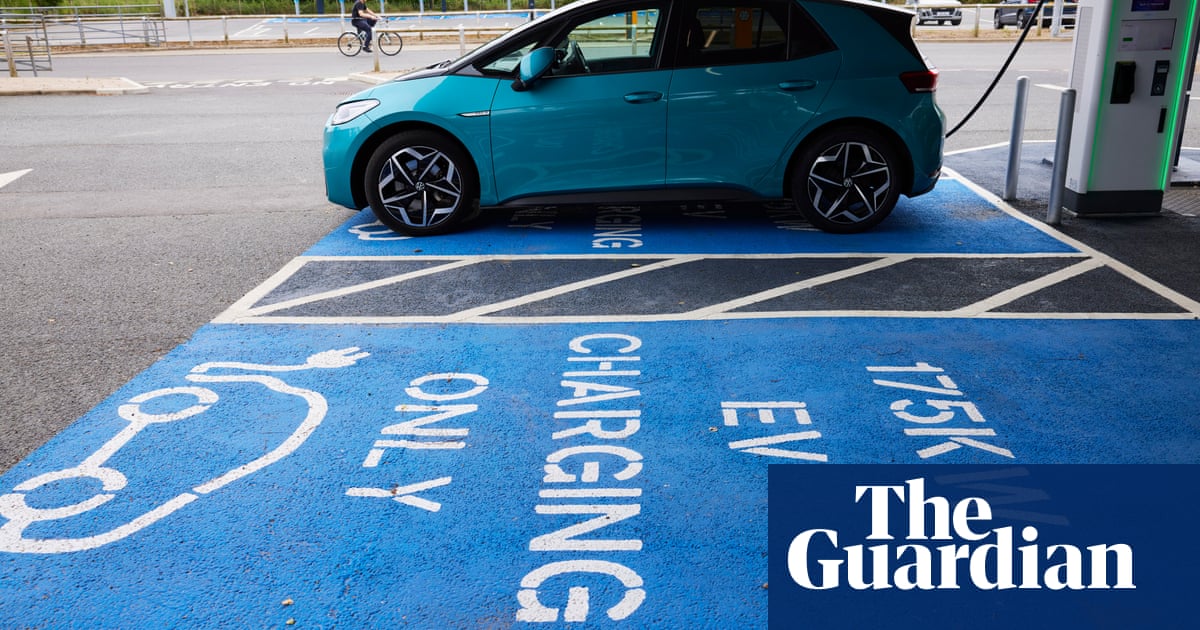
Britain’s biggest housebuilders privately lobbied for the government to ditch rules requiring electric car chargers to be installed in every new home in England, documents have revealed.
The FTSE 100 construction firms Barratt Developments, Berkeley Group and Taylor Wimpey were among the companies who argued against the policy in responses to an official consultation seen by the Guardian. The “blatant lobbying efforts” were criticised by Transport & Environment, a campaign group.
Swapping cars powered by fossil fuels for zero-emission models is viewed by scientists, environmental campaigners and the government as key to reaching net-zero carbon emissions – alongside increased public and active transport. However, the lack of chargers is seen as a barrier to uptake.
The rules requiring all new homes to have a charger were announced by Boris Johnson in November 2021 as the flagship policy of a speech to business leaders. While the details were overshadowed at the time, as the former prime minister meandered through his speech with a riff on the children’s cartoon character Peppa Pig, the government hopes 145,000 charging points will be installed thanks to the rules.
However, the housebuilders who responded stated their opposition to the policy, citing cost concerns. They also warned that mandating installation could lock homeowners into obsolete technology, that there could be a risk of electric shocks with some car chargers, and even that the plan could prevent owners from choosing between cars with different plug types used in Asia and Europe.
Taylor Wimpey warned that the installation of chargers could result in fewer homes being built. “We see practical and financial challenges associated with the proposed approach,” it wrote, citing “significant uncertainty over the financial costs”.
Berkeley Group said it did not believe chargers would be required at every parking space because people would charge at work or while “going to the gym”.
However, automotive industry leaders say charging at home is more attractive for users because it removes the need to search for available power outlets during the day and because smart tariffs allow people to charge overnight, when energy is cheapest.
The housebuilders argued that their responsibilities should end with the laying of “cable routes” into homes, which could then be used for charging points, saying this would avoid the installation of infrastructure that went unused. In most cases, these would be simple – and cheap – pipes or gutters that could later carry cables to parking spaces.
Matt Finch, T&E’s UK policy manager, said: “It’s absurd that housebuilders attempted to hold back progress and slow down the drive to net zero. In the future, all cars will be electric, and futureproofing new homes with charging infrastructure is an obvious step to take.
“The government should be applauded for resisting these blatant lobbying efforts.”
Cost concerns were a common theme in the housebuilders’ warnings. Barratt said mandatory chargers could cost it as much as £63m. Vistry Group, which recently changed its name from Bovis Homes, argued that the requirement would cost the FTSE 250 company up to £14m.
The details of the lobbying efforts came in freedom of information disclosures obtained by the Guardian, as part of the building industry’s response to ministers consulting on the new charging point rules in late 2019 – before the government introduced the measure.
Spokespeople for Berkeley Group and Taylor Wimpey said they supported moves to encourage electric vehicle adoption. The companies are now installing charging points in line with the law.
The Taylor Wimpey spokesperson said it had provided “constructive feedback” ahead of the rules being introduced, while arguing that a “wire-only approach” would have reduced the “need for retrofitting in the event of incompatible technology should electric vehicle charging technology advance”.
A Barratt spokesperson said its view in 2019 was that there was not “sufficient supply chain capacity to support full electric vehicle charging point rollout nationwide”. Since then it has worked with the government on regulations that give customers choice while “being practical for the industry to deliver at scale”.
Vistry did not respond to a request for comment.












